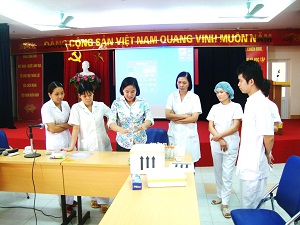
27 June 2014 - Vietnam - Multi-drug resistant tuberculosis (MDR-TB) is a hard-to-treat form of TB that is impervious to the most powerful TB drugs. Vietnam is one of the 27 high-burden countries for MDR-TB but, unfortunately, has just two national laboratories (in Hanoi and Hochiminh) equipped for MDR-TB diagnosis. As a result, all health facilities throughout Vietnam must send patient specimen to these laboratories for MDR-TB testing. Specimen deliveries are often impeded by Vietnam’s poor road conditions and underdeveloped transportation systems. Diagnosis delays mean many infected with TB are not treated in time, causing high patient morbidity and mortality.
In 2010, seeking to address this problem, Vietnam’s National Tuberculosis Control Program (NTP) asked the USAID-funded TB CARE I project to help improve the national TB specimen referral system. TB CARE I is led by KNCV and its partners, Management Sciences for Health (MSH) and the World Health Organization. MSH responded to the NTP’s request by conducting a laboratory needs assessment, which showed that staff were not using standard operating procedures (SOP) for packaging and sending TB specimens to the national laboratories. This was problematic, as unsafe packaging and transportation can damage samples and, if they are exposed, infect people in close proximity. Vietnam’s warm climate also poses a risk to poorly packaged specimen samples, which must be kept cool to ensure accurate test results.
To improve the safety and efficiency of the national specimen referral system, MSH worked with the NTP to develop SOPs for triple packaging and safe delivery of specimen samples. The team then conducted on-site training on the new SOPs for staff from five pilot facilities and hired a private courier company to transport the specimens from these facilities to the national laboratories. To further ensure safety, MSH provided secure packing materials to all five pilot sites.
After six months pilot testing use of the new SOPs, packaging materials, and the private courier system, the total number of specimen examined at the Hanoi laboratory had increased by 30 percent (from 21,870 to 28,413) and the total number of specimen examined at the Hochiminh laboratory had increased by 46 percent (from 17,160 to 25,097). Staff from the five pilot sites also reported reduced specimen delivery times. For example, prior to MSH’s intervention, staff at the National K74 Hospital Laboratory had to wait three weeks to receive test results from the Hanoi laboratory. Since the intervention, however, results’ delivery time has reduced to just one week. Many staff also praised the safety and efficiency of the new referral system.
"[The specimen referral system] is much more convenient now. It’s safe for our staff and environment. My staff does not need to travel to Hanoi and back by motorbike carrying samples," said Dr. Hien, Head of the National K74 Hospital Laboratory.
"I don’t have to wake at 4:00 a.m. and spend a lot of time on the buses [to deliver TB samples for testing]. I have more time to do other work at my laboratory now," said Ms. Hong, a staff member at the Can Tho TB and Respiratory Disease Hospital.
Since completing this successful pilot phase, MSH has been working with the NTP to expand these interventions to 99 additional sites throughout Vietnam. The team is also establishing a delivery system through the national postal service, which will replace the more expensive courier system. Improved specimen quality and reduced delivery times will lead to more accurate MDR-TB detection and treatment in Vietnam.
Source: Stop TB Partnership